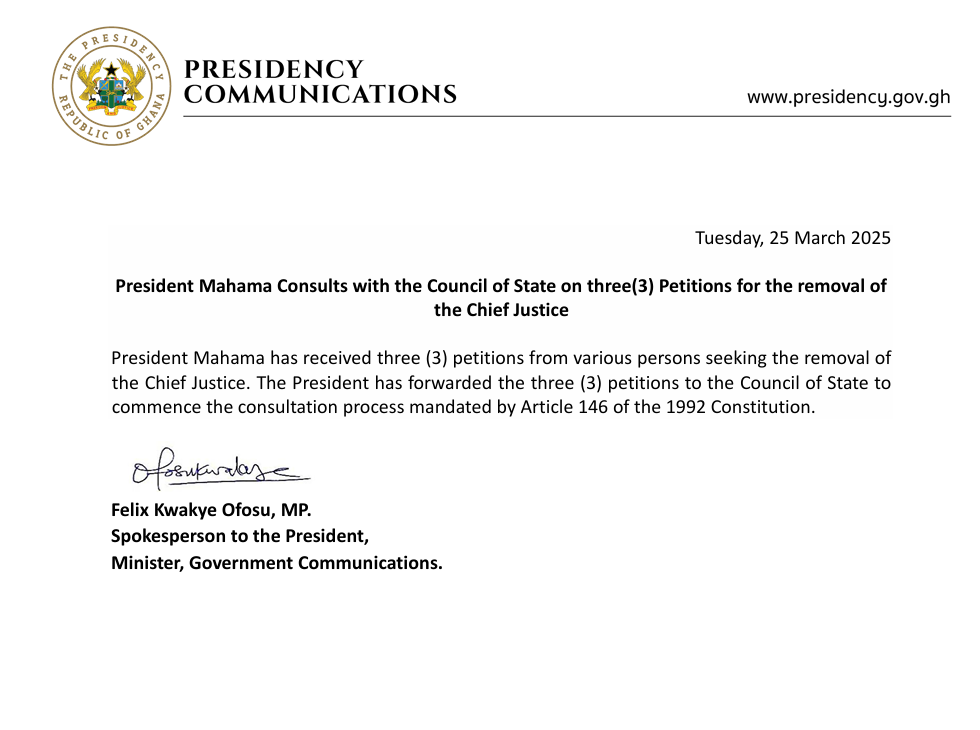Mahama forwards Chief Justice removal petitions to Council of State
President John Mahama has initiated discussions with the Council of State after receiving three petitions calling for the removal of Chief Justice Gertrude Sackey Torkornoo.
A letter signed by Felix Kwakye Ofosu, the Spokesperson to the President and Minister for Government Communications, indicated that all these petitions have been sent to the Council of State, following the constitutional procedures set out in Article 146 of the 1992 Constitution.
While the specifics of the petitions have not been revealed, this marks the start of an official process that may lead to considerable changes within Ghana’s judicial framework.
The Council of State is tasked with reviewing the petitions and providing guidance to the president on subsequent actions according to the constitutional guidelines for removing a Chief Justice.

It will be recalled that in early January this year, former President Akufo-Addo rejected a petition for Chief Justice Torkornoo’s removal.
After thorough consultations with the Council of State, the former president determined that the petition, presented by Prof. Stephen Kwaku Asare, lacked sufficient merit and did not establish a prima facie case that would necessitate further inquiry.
The petition alleged misconduct and incompetence on the Chief Justice’s part, including claims related to panel reconstitution, the issuance of practice directions, and violations of the constitution.
Nevertheless, the president’s assessment highlighted significant deficiencies in the petition’s claims.
The law that surrounds the removal of the Chief Justice is enshrined in Article 146 of the Constitution.
Article 146: Removal Of Justices Of Superior Courts And Chairmen Of Regional Tribunals
1) A Justice of the Superior Court or a Chairman of a Regional Tribunal shall not be removed from office except for stated misbehaviour or incompetence or on ground of inability to perform the functions of his office arising from infirmity of Body or mind.
(2) A Justice of the Superior Court of Judicature or a Chairman of a Regional Tribunal may only be removed in accordance with the procedure specified in this article.
(3) If the President receives a petition for the removal of a Justice of a Superior Court other than the Chief Justice or for the removal of the Chairman of a Regional Tribunal, he shall refer the petition to the Chief Justice, who shall determine whether there is a prima facie case.
(4) Where the Chief Justice decides that there is a prima facie case, he shall set up a committee consisting of three Justices of the Superior Courts or Chairmen of the Regional Tribunals or both, appointed by the Judicial Council and two other persons who are not members of the Council of State, nor members of Parliament, nor lawyers, and who shall be appointed by the Chief Justice on the advice of the Council of State.
(5) The committee appointed under clause (4) of this article shall investigate the complaint and shall make its recommendations to the Chief Justice who shall forward them to the President.
(6) Where the petition is for the removal of the Chief Justice, the President shall, acting in consultation with the Council of State, appoint a committee consisting of two Justices of the Supreme Court, one of whom shall be appointed chairman by the President, and three other persons who are not members of the Council of State, nor members of Parliament, nor lawyers.
(7) The committee appointed under clause (6) of this article shall inquire into the petition and recommend to the President whether the Chief Justice ought to be removed from office.
(8) All proceedings under this article shall be held in camera, and the Justice or Chairman against whom the petition is made is entitled to be heard in his defence by himself or by a lawyer or other expert of his choice.
(9) The President shall, in each case, act in accordance with the recommendations of the committee.
(10) Where a petition has been referred to a committee under this article, the President may-
(a) in the case of the Chief Justice, acting in accordance with the advice of the Council of State, by warrant signed by him, suspend the Chief Justice;
(b) in the case of any other Justice of a Superior Court or of a Chairman of a Regional Tribunal, acting in accordance with the advice of the Judicial Council, suspend that Justice or that Chairman of a Regional Tribunal.
(11) The President may, at any time, revoke a suspension under this article.



